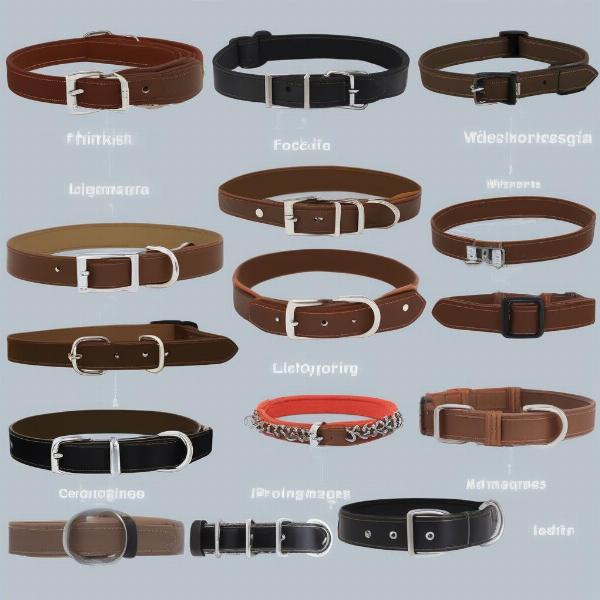When it comes to dog ownership, a strong dog collar is a fundamental piece of equipment. It’s not just about fashion; a strong, reliable collar is crucial for safety, control, and even your dog’s comfort. But with so many options available, finding the right “dog collars strong” can feel overwhelming. This article will guide you through the different types of strong dog collars, helping you choose the perfect fit for your furry friend.
Understanding the Importance of Strong Dog Collars
A strong dog collar is essential for several reasons. Primarily, it provides a secure point of attachment for your dog’s leash, allowing you to maintain control during walks and preventing them from running into dangerous situations. A sturdy collar also plays a vital role in training, providing a gentle but firm way to communicate with your dog. Furthermore, a strong collar can hold identification tags, ensuring your dog’s safe return if they ever get lost. Choosing a collar that’s both strong and comfortable is key to a happy and safe dog.
 Different Types of Strong Dog Collars
Different Types of Strong Dog Collars
Types of Strong Dog Collars
There are several types of strong dog collars available, each with its own pros and cons. Understanding these differences will help you make an informed decision.
Leather Dog Collars
Leather collars are a classic choice, known for their durability and stylish appearance. They offer excellent strength and become softer and more comfortable with age.
Nylon Dog Collars
Nylon collars are a popular option due to their affordability, durability, and wide range of colors and patterns. They are also easy to clean and maintain.
Metal Chain Collars
Metal chain collars, while strong, should be used with caution. They can be uncomfortable for some dogs and should never be used for training purposes.
Martingale Collars
Martingale collars are designed to tighten slightly when a dog pulls, discouraging pulling without choking. They are a popular choice for training and for dogs who tend to slip out of regular collars.
Choosing the Right Size and Fit
Choosing the right size and fit is crucial for your dog’s comfort and safety. A collar that is too tight can cause choking or skin irritation, while a collar that is too loose can easily slip off. Measure your dog’s neck circumference and add two inches to determine the appropriate collar size.
Material Matters: Durability and Comfort
Consider your dog’s lifestyle and activity level when choosing a material. For active dogs who spend a lot of time outdoors, a durable and water-resistant material like nylon might be the best choice. tartan dog collars are also an option for a fashionable yet durable choice. For dogs with sensitive skin, a soft leather collar might be a more comfortable option. Handmade accessories such as handmade dog accessories can offer unique designs and high-quality materials.
Training and Behavioral Considerations
The type of collar you choose can also impact your dog’s training and behavior. slip collars for dogs are often used for training, but it’s important to know how to use them safely and effectively. For dogs who pull excessively, a harness might be a better option than a collar.
Caring for Your Dog’s Collar
Regular cleaning and maintenance will extend the life of your dog’s collar. Leather collars require occasional conditioning, while nylon collars can be washed with soap and water. Inspect your dog’s collar regularly for signs of wear and tear and replace it as needed.
Conclusion
Choosing the right strong dog collar is an important decision for every dog owner. By considering your dog’s size, breed, activity level, and training needs, you can find a collar that is both strong and comfortable. Investing in a high-quality, durable collar will ensure your dog’s safety and enhance your bond for years to come. Remember, a strong dog collar isn’t just about strength; it’s about finding the perfect balance of security, comfort, and functionality for your beloved companion.
FAQ
-
How often should I replace my dog’s collar? Replace your dog’s collar as soon as you notice signs of wear and tear, such as fraying, cracking, or broken buckles.
-
What type of collar is best for a puppy? A lightweight, adjustable nylon or leather collar is a good choice for a puppy.
-
Can I leave my dog’s collar on all the time? While it’s generally safe to leave a collar on, it’s a good idea to remove it occasionally to allow your dog’s skin to breathe. Consider using cooling coats for dogs for hot weather.
-
What is the best type of collar for a dog that pulls? A harness or a martingale collar might be a better option than a regular collar for a dog that pulls.
-
How do I measure my dog’s neck for a collar? Use a flexible measuring tape and measure around your dog’s neck, just below the ears and above the shoulders. Add two inches to this measurement to determine the appropriate collar size.
-
What is a sable dog colour? If you are curious about dog coat colours, you can check out our article on sable dog colour.
-
Are there any special considerations for senior dogs and collars? Senior dogs might benefit from a softer, padded collar for added comfort.
About ILM Dog
ILM Dog is your trusted international resource for all things dog-related. We offer expert advice on dog breeds, health, training, nutrition, grooming, and much more. From choosing the right breed to understanding the nuances of canine behavior, ILM Dog is committed to providing valuable insights and resources to dog owners worldwide. We specialize in connecting dog lovers with the information and products they need to provide the best possible care for their furry companions. Our expertise covers a wide range of topics, including breed selection, health and wellness, training techniques, nutritional guidance, grooming tips, and a curated selection of products and accessories. Contact us at [email protected] or +44 20-3965-8624.